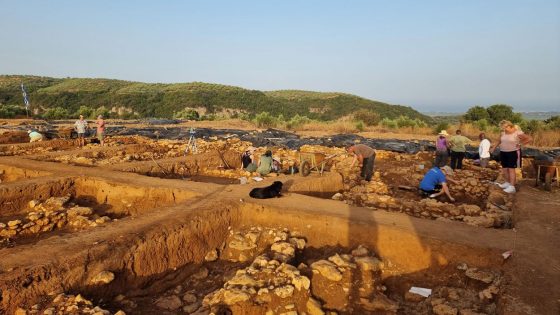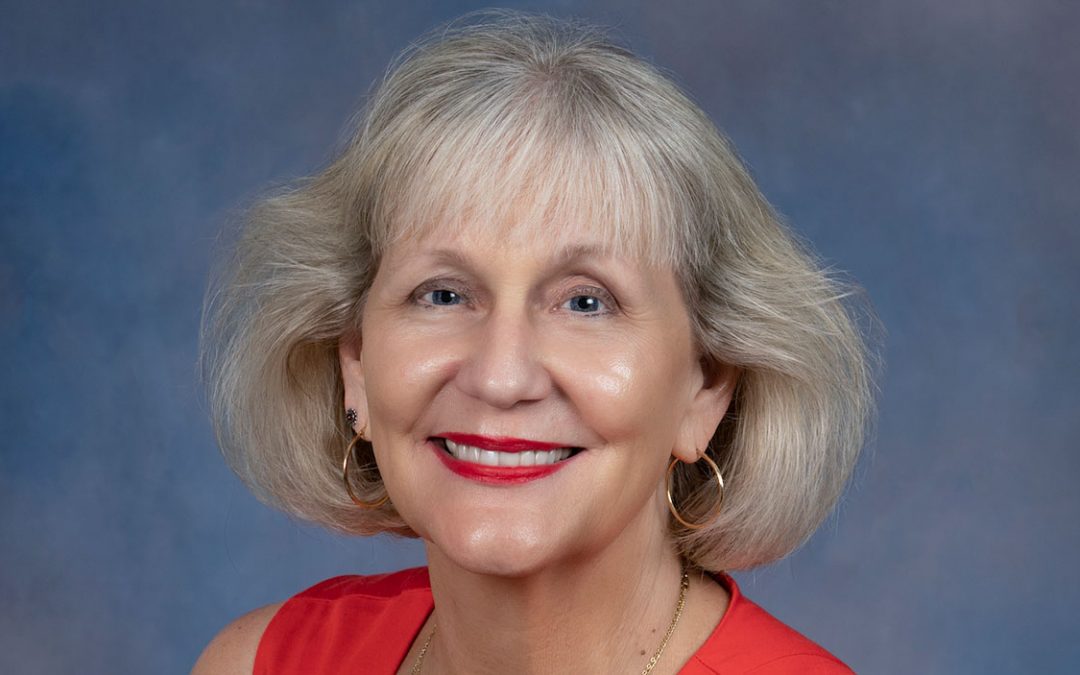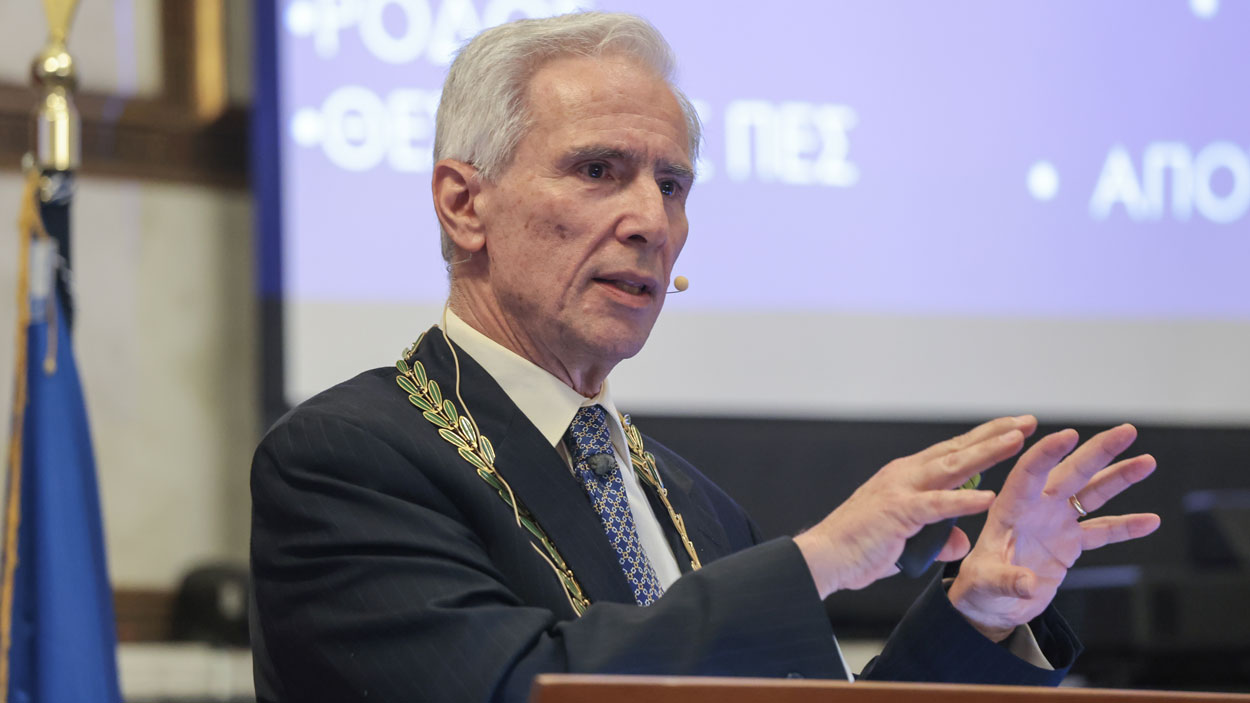
Michael Cosmopoulos, the Hellenic Government-Karakas Family Foundation Professor in Greek Studies, gives a lecture at his induction into the Academy of Athens on June 11. (Photos courtesy of Michael Cosmopoulos)
Michael Cosmopoulos stood before a crowd in oblong-shaped main hall of the Academy of Athens.
The room was full of marble with two sets of pillars flanking the doors at either end and a large mural by German artist Christian Griepenkerl adorning the walls and depicting Aeschylus’ “Prometheus Bound.”
It was in that setting on June 11 that Cosmopoulos, professor of archaeology and the Hellenic Government-Karakas Family Foundation Professor in Greek Studies at the University of Missouri–St. Louis, formally took his place among the “Immortals,” as regular members of Greece’s national academy of arts and sciences are known.
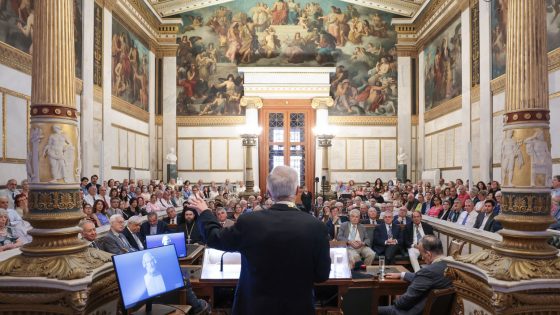
Michael Cosmopoulos speaks to an audience of approximately 350 people on hand for his induction lecture in the oblong-shaped main hall of the Academy of Athens.
During his formal induction, Academy of Athens President Stamatis Krimizis bestowed upon Cosmopoulos a gold medal, an elegant gold pin and an official diploma recognizing him as the Chair of Bronze Age Archaeology. Cosmopoulos then had the opportunity to give a lecture on archaeology and Greek epic poetry.
The Academy of Athens was founded in 1926 but has roots in the historical Platonic Academy. To be elected to this esteemed institution is considered the highest honor a scholar can achieve. There are only about 40 members at a given time – each designated chair of their chosen field of study and considered the top scholar in that area – and they hold onto their titles until their deaths.
Cosmopoulos’ contributions to the field include his excavations at Eleusis, the home of the famed ancient secret cult known as “Eleusinian Mysteries,” and the excavation of the ancient Peloponnesian village of Iklaina in southwestern Greece. His discoveries there over the past 25 years have helped shape people’s understanding of the origins of a two-tiered system of government.
That work recently also helped earn Cosmopoulos an honorary professorship from the University of Peloponnese.
UMSL Daily recently conducted an email Q&A with Cosmopoulos about both honors and his work on the excavation at Iklaina, which is continuing this summer.
You learned of your election to the Academy of Athens last year, but did it feel different to actually go through the induction ceremony?
While being elected to the Academy last year was undoubtedly a tremendous honor, actually experiencing the induction ceremony firsthand brought a whole new level of meaning and emotion to the election. The ceremony itself is steeped in tradition and ritual, with a profound sense of formality and significance that marks a scholar’s transition to full membership in the Academy. As I stood receiving the insignia and delivering my lecture, the weight of the moment truly sank in. The speeches, the symbolic presentation of the medal and pin, and the entire atmosphere of the event made the honor feel tangible and real in a way that mere selection alone could not fully convey.
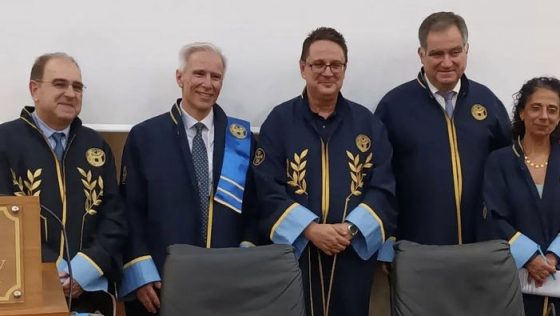
Michael Cosmopoulos is recognized with an honorary professorship at the University of Peloponnese on May 30.
Did you have a lot of friends and family members on hand for the induction?
I was deeply touched by the outpouring of support and the large turnout for the ceremony. The event drew an audience of approximately 350 people, including family members, friends, colleagues and members of the public, and was watched by an online audience of about 200. It was particularly gratifying to see such a strong showing of interest in the topic of my lecture, which explored the fascinating intersection of Homer’s epic poems and the archaeological discoveries related to it. The popularity of this subject, I think, shows the enduring relevance and appeal of Greek studies in our modern world.
How big an accolade was your honorary professorship?
Receiving an honorary professorship from the University of Peloponnese is an exceptional honor that I hold in the highest regard. Such recognitions are bestowed rarely, making this a truly humbling and gratifying achievement. I am profoundly grateful to the university for this distinction.
What involvement, if any, have you had with the university previously? And will you have any further involvement resulting from this recognition?
We have cooperated with their Archaeometry lab in conducting scientific analyses for the Iklaina excavation. The honorary professorship will allow a closer collaboration between UMSL and the university, including increased potential for study abroad and student exchange programs.
You left Athens soon after your induction and are now back at Iklaina. What are your goals there for the summer?
This summer marks a pivotal moment in our research, as it is the last large-scale excavation season funded by a major National Science Foundation grant. Our primary objective is to explore the early history of Iklaina by investigating the deeper strata of this ancient city. This work is crucial to the overarching aim of our project, which is to study the origins of state formation in the Western world. By reconstructing the evolution of Iklaina from its earliest days to its emergence as a state capital, we are piecing together a vital chapter in the story of human civilization. It is painstaking work, especially with the higher-than-normal temperatures, but every artifact and structure we uncover brings us closer to understanding the complex processes that shaped our political and social world.
Are there any UMSL students working with you on the excavation this summer?
Yes, we are thrilled to have six dedicated UMSL students joining us on this extraordinary archaeological adventure, along with 12 students from other universities and non-student volunteers. Two of the UMSL students are participating through a Research Experiences for Undergraduates grant I secured from the National Science Foundation. This not only provides invaluable hands-on experience for our students but also underscores UMSL’s commitment to fostering the next generation of archaeologists and historians. These students are not just observing history – they are actively uncovering it, contributing to groundbreaking research that could reshape our understanding of ancient Greek civilization.

